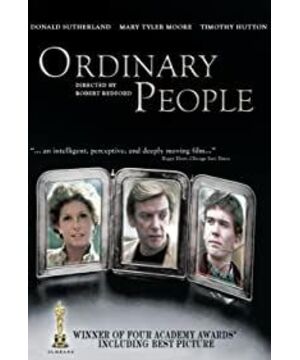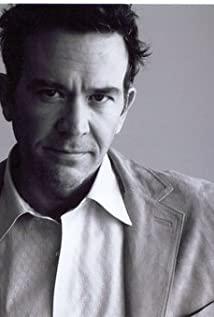The famous ending of Fox's novel "The Sound and the Fury"-"They are suffering." This sentence can not be more apt to be placed on the "mother" in "Ordinary People".
The eldest son died in an accident, and the other three members of the family collapsed, completely deviating from the normal track. The healing process was very difficult. They hurt each other and defended each other. The youngest son and father finally came out, but the "mother" struggled in the abyss of pain and seemed to see no end.
The three people in the play, the nervous and depressed young son, and the loving and heavy father, are common in many movie themes, but the psychological character of a woman who reflects a "middle-aged child lost" and "menopausal" superimposed is very rare. Less in place, impressive.
This woman is annoying and hateful, and is the root cause of the lack of peace in the family. Many women can see her own shadow in her various behaviors, which is a reflection and alertness.
But she is sympathetic. Women whose sons are around 18 years old usually have reached menopause. The unbalanced and unstable secretion of hormones from the body causes women to be irritable, sensitive, frustrated, and very strong. This in itself requires more care and tolerance from family members. But the flying misfortune drove her into the darkness, unable to extricate herself.
1. She is in pain. The middle-aged bereavement, what else can make a "mother" more painful than this? The son was once a piece of flesh on his own body. From the connection between flesh and blood at the beginning of life, to the emotional empathy that grows up after birth, this is a feeling of interdependence between life and death that a father can never understand. I have read some reports of families who lost their loneliness. The man was suffering and numb, but he was able to get out in the end. A woman can never come out, one year, five years, ten years, every time she goes to the grave, crying, crying back, life has long since withered. And inexplicably feel inferior, ashamed to see others. If she can still socialize with people normally, or even cry at funerals, it is only because she has a higher-than-average disguise, and that damn pride, self-esteem and reason will not allow her to collapse. In the play, she is strong on the surface, elegantly dressed, talking and laughing exaggerated, but who has thought about her inner trauma? Those uncomfortable actions are just a hard shell of her self-protection. I have seen a lot of comments saying that "mother" prefers the elder son and cannot divide the love equally, but just imagine, if it is the younger son who died, would her reaction be the same? She said that her mother was indifferent, and there was no love in her heart, only the vanity of maintaining a normal life. Just imagine the fundamental reason for her to do this? The eldest son died of self-willed carelessness. Isn't this the result of mom's spoiling? Her mother's self-blame completely subverted her values and made her feel that loving her child is a mistake, and that the death of her elder son is a punishment for her love. So she dared not give love to her younger son anymore, and deliberately kept her distance from the younger son, not allowing herself to care about him. The youngest son couldn't eat the breakfast she made. She reacted so badly that she immediately dumped it. She was sick in her heart, but wrapped herself in a hard shell, did not go to the psychiatrist, and did not show her wounds.
2. The younger son and husband hurt her twice. Everyone was angry with the mother's second injury to the youngest son, but they didn't realize that the youngest son and husband were also hurting her. Judging from the dialogue between the people in the play, she used to be gentle, peaceful, reasonable, and the backbone of the family. After the death of her eldest son, she suffered internally on the one hand, and pretended to be strong on the other. It's okay to continue to be a pillar, but it's too difficult to continue to be gentle and peaceful. The neurotic reactions of young sons that are different from those of normal people, especially suicide, are terrible torture for a mother. Don’t watch, listen, don’t love, is it all right? She hardened her heart. But I really don't look at it or love it, my son still keeps hurting her. I didn't tell her when I quit the swimming class, and I didn't tell her when I went to see a psychologist. It was simply that she didn't exist. The son slowly healed and hugged her, but she hadn't reacted yet, and she didn't know what had happened. If you change you, will the coldness in your heart be melted by a hug or two? There are two places in the play that my mother was shocked, which was also my shock. First, Dad finally got the courage to say "We are going to the funeral of our son, but you care about what I wear"-this is just a woman's habit of worrying about it. It is not appropriate to wear blue at the funeral, but white is the right thing to wear. The least respect from my son. Let's talk about such a big thing, you have buried it in your heart for so long and so long, and finally brought it up in this way. You said it earlier, and I just don't care about you! At such a painful moment, if you don't say it, who cares what you said before? Second, my father was sitting in the restaurant for a long night and weeping. My mother asked me cautiously why. Didn’t my father say, “It’s painful to lose the eldest son, I am painful for the younger son, and I know you are also painful.” These words actually said, “You Do you love me? I feel that you only love yourself" nonsense. To be honest, I was no less shocked to see my mother at this time. The husband and wife have been married for so many years, and the son is so big. Do you love or not love? Don't you have a B number in your mind? Even if it seems that there is no love anymore, don't you know what lies beneath the indifferent and strong surface of a woman? Dad's focus is all on his son, so how can he really care about his wife?
The few seconds when the woman went upstairs to pack her clothes and walked away. Her departure was a touch of comfort. The son and husband are healing slowly, but she is the only one who is still suffering. She is such a strong person, she may have been away for a while, in a corner where there is no one, and the wound will be able to scab slowly!
View more about Ordinary People reviews











